A review and sample photos of the LEICA APO MACRO ELMARIT R 100mm F2.8 lens used with both film and digital cameras.
Table of contents
Gallery
The following cameras were used to take the sample photos:
Review
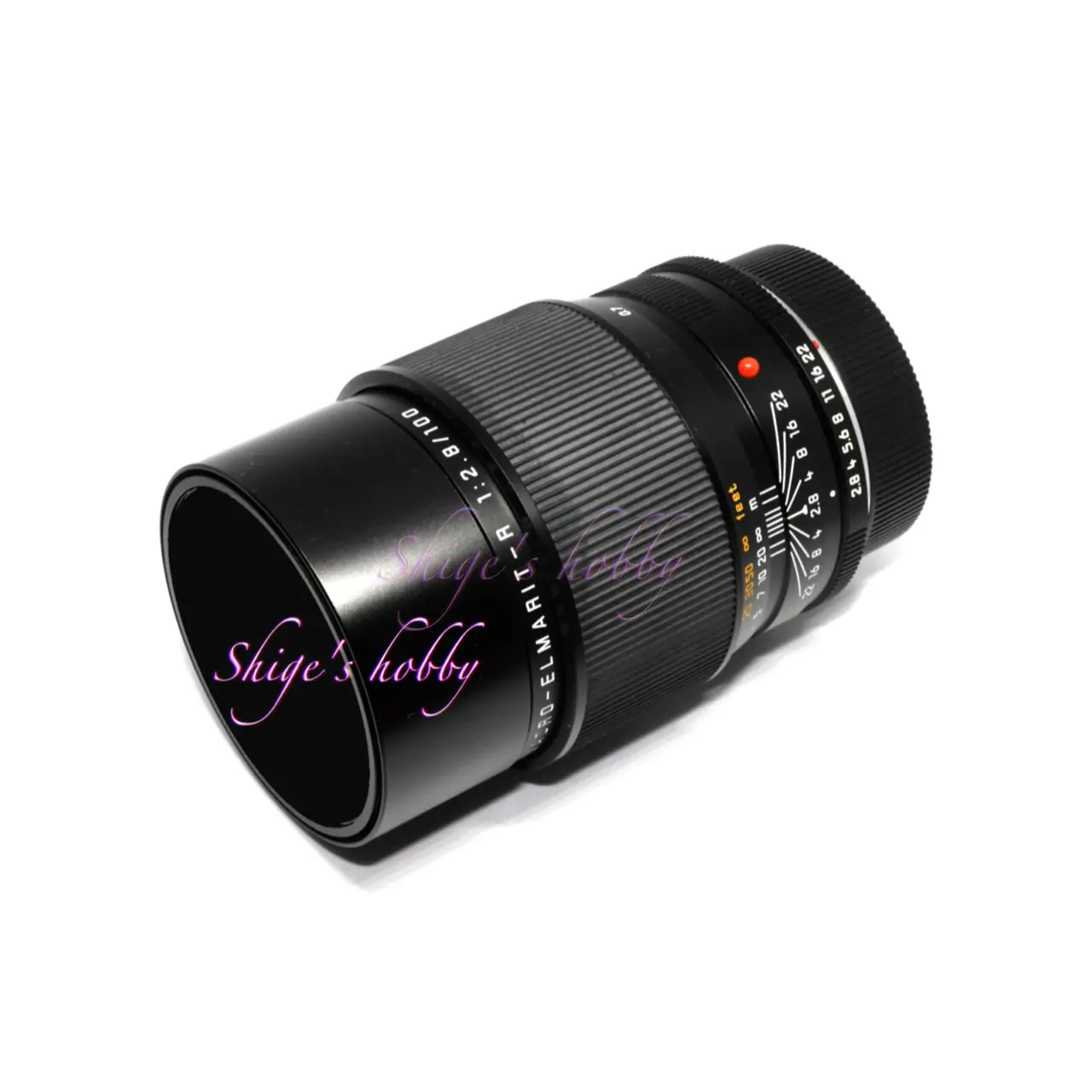
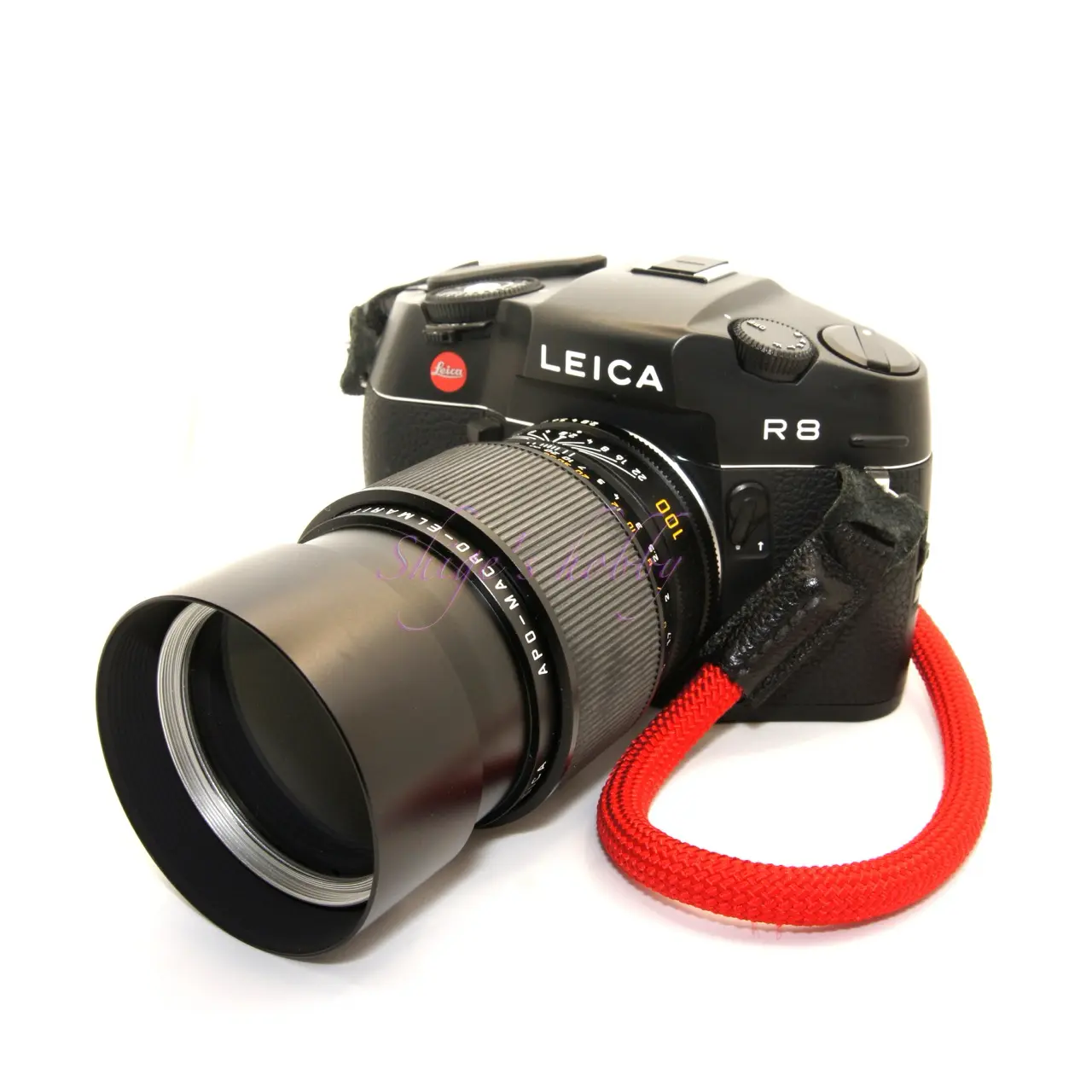
1.Overview
The APO Macro Elmarit 100mm is a macro lens for Leica R mount released in 1986.
The main specifications are as follows, and detailed specifications are listed in the table.
- Aperture value: 2.8
- Lens construction: 8 elements in 6 groups
- Aperture blades: 7
- Minimum shooting distance: 0.45m
- Maximum shooting magnification: 1:2
- When using ELPRO 1:2-1:1 FOR R 2.8/100: 1:1
- Hood: Built-in retractable type
- Filter diameter: 60mm (E60)
The LEICA WIKI records that 20,000 units were shipped between 1986 and 2000.
R mount variations include 3-CAM, R-CAM, and ROM.
2.Usability
The APO MACRO ELMARIT R 100mm F2.8, also known as AME (an acronym for APO MACRO ELMARIT), is one of the famous Leica R lenses. Due to the large number of units shipped, it is relatively common to find it on the used market.
The lens hood is built-in; you pull out the hood located at the front of the lens to use it.
Since there is no stopper on the hood, it feels somewhat loose. While I wouldn’t want to experience this, it’s possible that the lack of a stopper might reduce damage in case of a lens drop, so whether this is good or bad is a matter of preference.
As a macro lens, the focus ring is wide, approximately 40mm, and the helicoid rotation angle is about 720 degrees. Therefore, with a properly functioning unit, precise focusing is possible with the appropriate amount of resistance in the helicoid.
The trend in lenses in the 2000s, not limited to macro lenses, was a focus on high resolution to match the digital age.
This lens, due to its older design, retains the soft rendering characteristic of the Leica macro lens lineage.
Turning the smooth focus ring with sufficient width, while looking at the focus point in the viewfinder and searching for the desired location, allows you to experience the true pleasure of using a manual lens.
When using the LEICA TL APO MACRO ELMARIT 60mm F2.8, another macro lens, in autofocus mode, the focus sometimes doesn’t stop at the visually apparent focus point, which can be frustrating.
Ultimately, I often use this lens in manual focus mode, but since it is an autofocus lens, there is no torque in the focus ring, so getting used to the focus operation was necessary.
Mount adapter
■ Film SLR camera
Looking at the results of shooting with the APO MACRO ELMARIT R 100mm F2.8 lens on a LEICA R8 camera using KODAK ProImage100 film, the grain of the negative film and the high-resolution rendering across the entire image produced by the lens are a good match.
Based on the negative film results, it seems that using a coarser monochrome film with an ISO of around 400 would be enjoyable, as it would complement the high resolution of the lens.
The LEICA R8 film camera, with its standard universal screen (14343), allows for accurate focusing from the widest aperture without any problems.
■ Digital SLR camera
Images taken with the APO MACRO ELMARIT R 100mm F2.8 on the Digital Module R are cropped because the camera’s image sensor is smaller than a 35mm film frame. The displayed focal length is multiplied by 1.37, resulting in a cropped image. A 90mm focal length becomes a 137mm equivalent focal length in 35mm format.
Because the edges, where imperfections are more visible, are cropped in digital cameras, a higher resolution image is obtained, and the cat’s fur is beautifully reproduced.
With the APO MACRO ELMARIT R 100mm F2.8, focusing was easily achieved using the standard universal screen (14392) of the DMR. There was rarely a need for the separately sold microprism screen, which improves focusing accuracy in the center. The focusing screen specifically designed for the DMR has a square frame inside to indicate the shooting area, adjusted for the smaller sensor size compared to 35mm film.
When shooting with a lens equipped with a ROM terminal on the DMR, the Exif information records the focal length, aperture value, etc. In the example below, it shows that the image was taken at a focal length of 100mm and an aperture of F2.8. However, there is some inconsistency in the data transfer to Exif with some ROM terminal lenses; in the image below, the maximum aperture value is rounded to 3. There are also instances where the focal length or aperture value is not transmitted, showing inconsistencies in specifications during the transition between the Leica analog and digital eras.
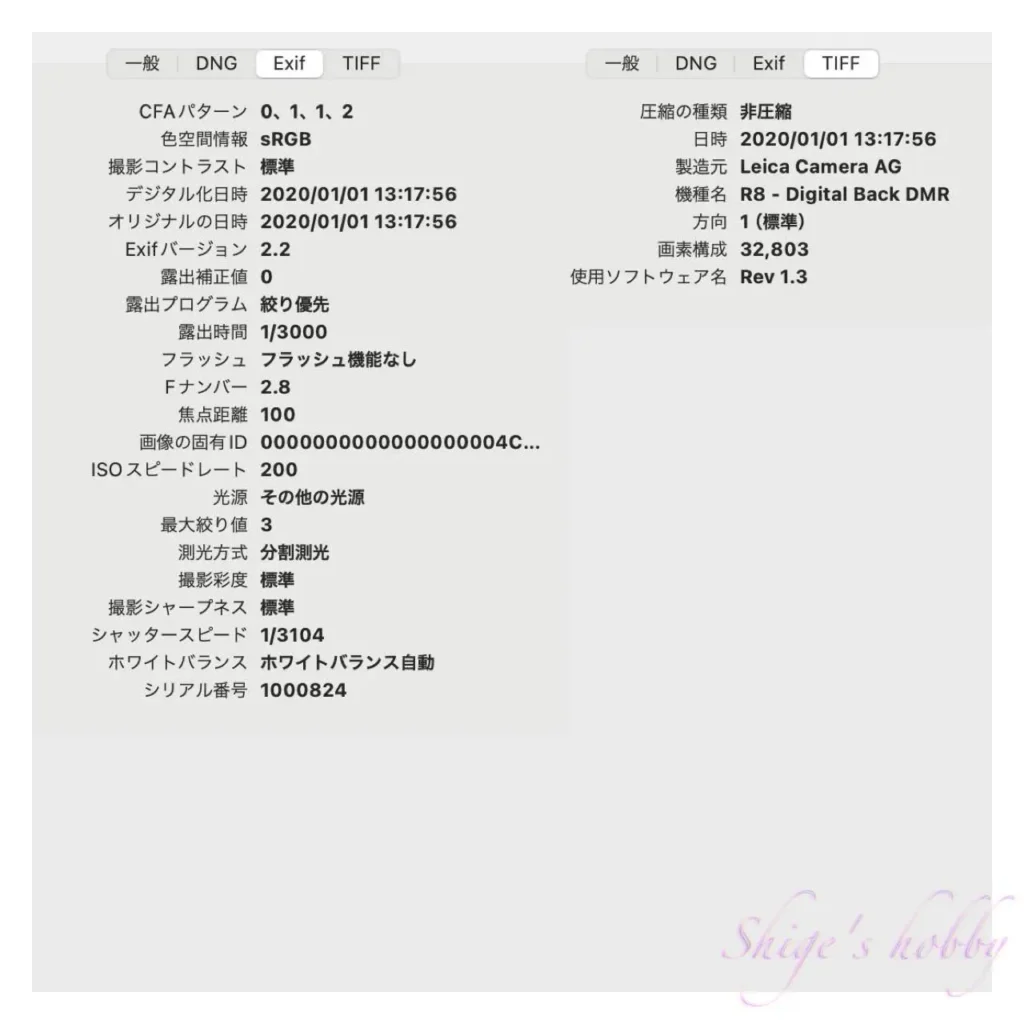
The Canon EOS 1Ds Mark III is a digital SLR camera equipped with a 20-megapixel 35mm full-frame sensor, and the APO MACRO ELMARIT R 100mm F2.8 lens handles this resolution without any problems.
Because the lens does not have any protrusions at the rear, it could be used without problems on the EOS-1Ds Mark III, which is sensitive to lens mounting issues.
Note that some R-mount wide-angle lenses may interfere with the sensor in the mirror box, causing the camera to display Error 20 (Err 20) and making them unusable.
The EOS-1D Mark IV and EOS 7D, which have smaller sensor sizes, can use this lens without problems. The change in focal length due to the sensor size is 1.3x (130mm) for the EOS-1D Mark IV and 1.6x (160mm) for the EOS 7D.
Since the EOS series cameras are basically designed for autofocus, focusing manually is easier on high-end cameras of the MINOLTA α series. However, with the APO MACRO ELMARIT R 100mm F2.8, there are no problems with focusing using the standard screen on the EOS-1 Ds Mark III and EOS-1D Mark IV.
■ Mirrorless camera
The LEICA SL Typ601 has a 24-megapixel 35mm full-frame sensor, which is about 20% more pixels than the Canon EOS 1Ds Mark III. However, a 20% increase in pixel count is hardly noticeable in practice.
Both cameras are equipped with 24-megapixel sensors, and although the sensor sizes differ, both cameras provide sufficiently practical resolution and sharpness.
When using the digital mirrorless Leica SL Typ601 with the genuine Leica mount adapter, the LEICA R-Adapter-L (16076), the focal length and aperture values are recorded in the EXIF data. This is extremely useful for lazy people who don’t like taking notes.
With mirrorless cameras that use an EVF, the focus position can be determined more accurately than with SLR cameras thanks to the focus magnification function.
However, in the digital age where EVFs are available, there are no problems with focus position if you focus carefully.
Depending on the model, image stabilization is performed in the camera body, so it can be said that we are experiencing a process of camera evolution that was unimaginable in the film era.
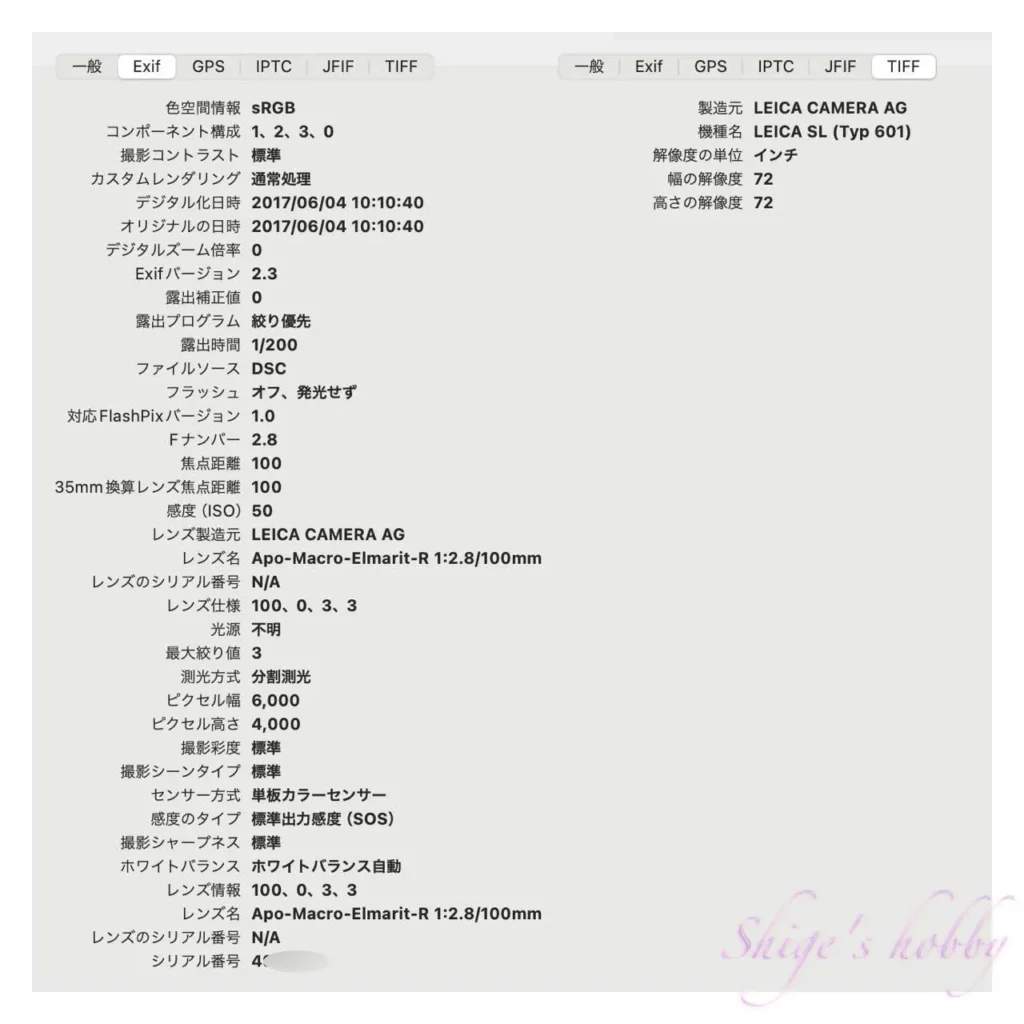
The Hasselblad X2D-100C is a mirrorless camera equipped with a medium-format digital sensor, which is larger than a 35mm film format sensor.
The APO MACRO ELMARIT R 100mm F2.8 has a wide image circle, completely covering the 44x33mm medium-format digital sensor used in the Hasselblad X2D (X1D/X1DII/X907/FUJI-GFX).
The focal length conversion factor compared to 35mm film is 0.8x, meaning that if the image circle covers the medium-format digital sensor, it becomes equivalent to a 72mm medium telephoto lens. The sample images are scaled-down versions of the 44x33mm medium-format digital sensor output images without cropping.
3.Summary
In conclusion, to summarize the APO MACRO ELMARIT R 100mm F2.8, it’s a half-macro lens for the R-mount, and its performance is more than sufficient for general use. With the optional ELPRO adapter, 1:1 magnification is also possible.
It has a smooth focusing feel typical of macro lenses, and the ample rotation angle makes it easy to operate. The image quality is impressive, especially the soft rendering at close distances, making it an outstanding lens among medium telephoto macro lenses.
At maximum aperture, focusing can be difficult with SLR cameras, sometimes requiring a change to a focusing screen optimized for precise focusing. In contrast, mirrorless cameras are much easier to use thanks to the magnification function of the electronic viewfinder, which makes setting the focus point simple.
Specifications, considerations, etc.
Competitive Lens
A lens to compare with the AME100 would be the CARL ZEISS MAKRO PLANAR 100 (MP100), which has the same manual focus and Yashica/CONTAX mount.
At CARL ZEISS, the word macro is written as MAKRO, which is the German word for “big, large”. As an aside, Nikon’s macro lenses are called Micro-Nikkor. For the origin of Nikon’s micro notation, see Nikon’s One Thousand and One Nights: Night 25 Ai Micro Nikkor 55mm F2.8 (Part 1).
1x macro or half macro
The two lenses were released in roughly the same time, the AME100 in 1986 and the MP100 in 1985, and it is thought that the design and manufacturing technology were at roughly the same level.
The biggest difference between the two lenses in terms of specifications is that, despite both having the same focal length of 100mm and the same minimum shooting distance of 0.45m, the lens magnification is different.
The magnifications of the two lenses are as follows.
- The AME100 is a half macro with a magnification of 1:2 for the lens alone.
- The MP100 is a life-size macro with a magnification of 1:1 for the lens alone.
- There’s a lot of information on the difference between life-size macro and half-macro if you search online. To summarize, when you photograph an object, if the object appears the same size on the film or sensor as the actual object, it’s called life-size (1:1), and if it appears half the size, it’s called half-size (1:2).
- With digital cameras, you view the image on the sensor on a monitor, so it’s difficult to compare the actual size of the object with the size of the photograph, so the terms life-size and half-macro are difficult to understand with a digital camera.
Life-size macro can capture a larger subject, but there are many situations where half-macro is sufficient.
To achieve a maximum magnification ratio of 1:1 with the AME100, it is necessary to use an optional lens called ELPRO, which screws onto the front of the lens. Since this ELPRO lens screws onto the 60mm filter thread, attaching it prevents the lens hood from being extended.
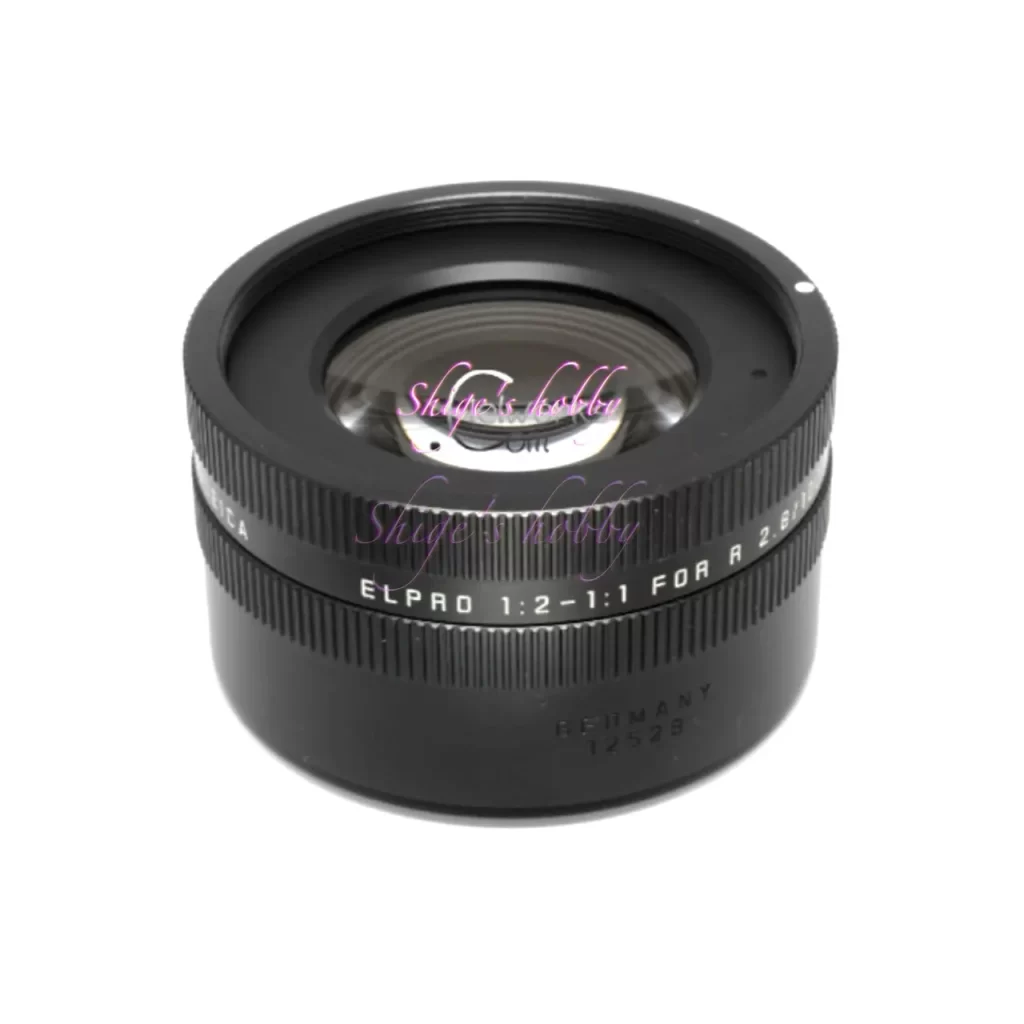
Focus Method
The two lenses use different focusing methods.
- AME100 Front focus type
- The front focus type is a method in which the focus position is adjusted by moving only the front lens group, and the focal length changes depending on the focus position.
- MP100 Full group extension
- Full group extension is a method of adjusting the focus position by moving both the front and rear groups, so the focal length does not change depending on the focus position, and there is little variation in aberration.
The difference in this extension method is the difference in the means to achieve the set performance.
The previously mentioned 1:1 macro and half macro are one of the set performances, and other set performances include cost and image quality.
Lens length comparison
It is interesting to see how the lens size changes when shooting due to this difference in focus method.
The lens length at the focal length of ∞ is 105mm for the AME100 and 87mm for the MP100, so the AME is longer, and the MP100 can be said to be compact when stored.
The lens length at the shortest shooting distance is 152mm for the AME100 and 172mm for the MP, so the MP is longer, and the MP100 changes the weight balance of the camera more when shooting. This may be a concern for some photographers.
The lens length differs by about 2 mm when the difference in lens flange back is taken into account, but since I want to show that the sizes are reversed here, the difference in flange back is ignored.
Full extension is not a condition for life-size macro, and other focus methods, including the front focus of the AME100, can also be used to achieve life-size shooting magnification. The HASSELBLAD HC 120mm that I own is a life-size macro with front focus.
I don’t have much experience with the Yashica/CONTAX mount and have never actually used this lens, so I don’t have any photos of it when extended, but I will post a photo of the CONTAX 645 APO MAKRO PLANAR 120mm, the older brother of the MAKRO PLANAR 100, because it has the same full extension as the MP100. You can see the MP100 in its fully extended state on the Lens.DB site in the reference link.
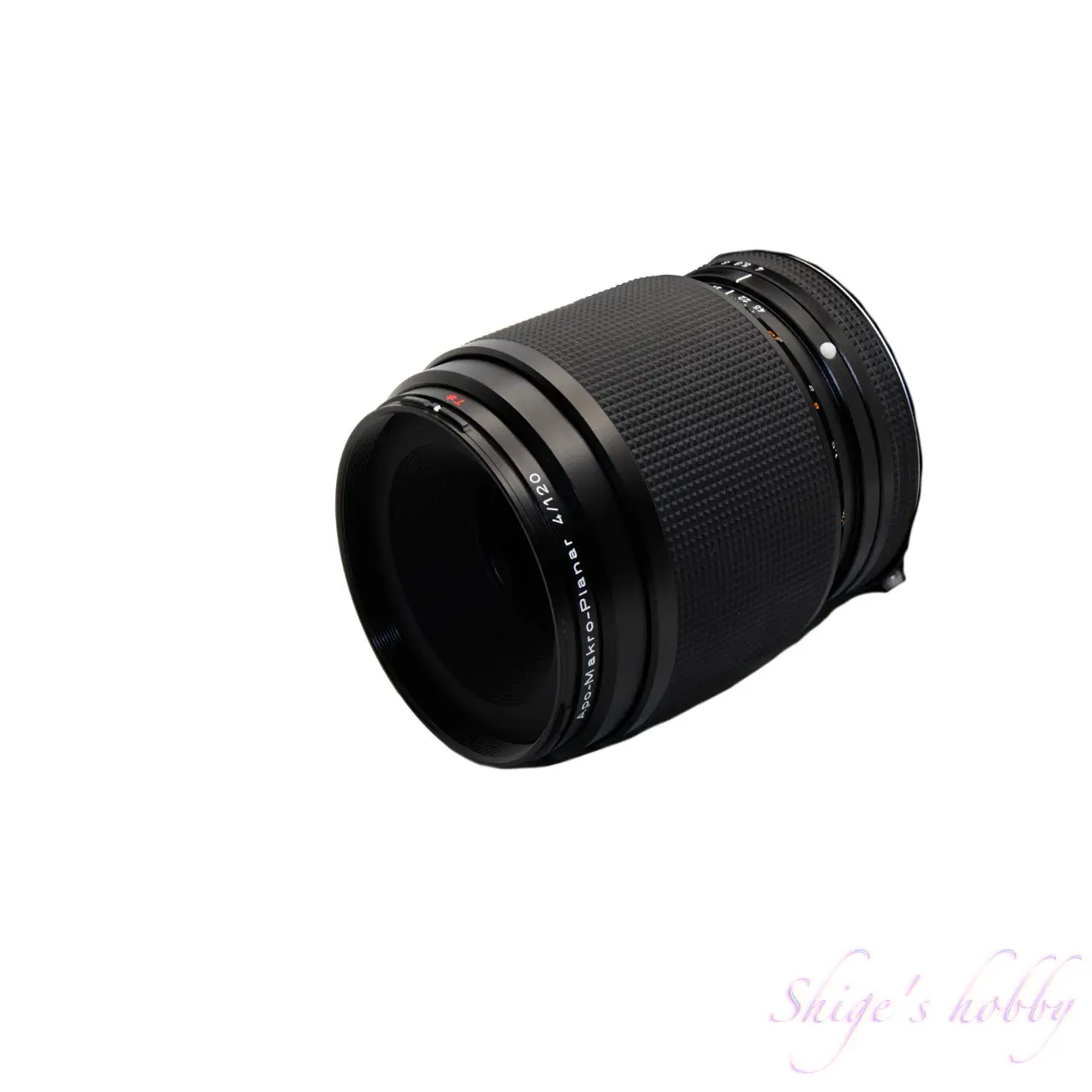
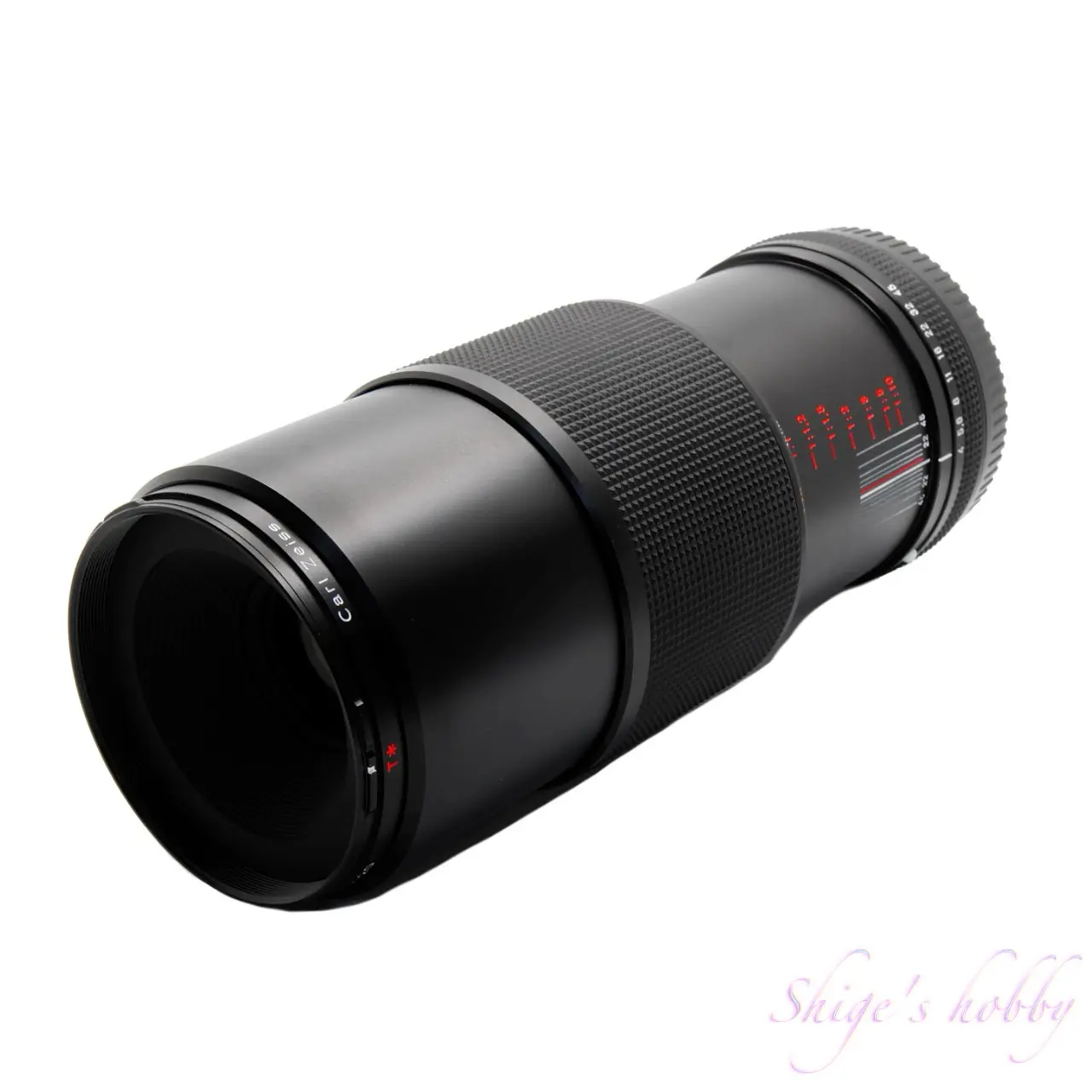
The CONTAX 645 APO MAKRO PLANAR 120mm is a lens that can take life-size photographs. As the APO designation suggests, this lens is better at correcting chromatic aberration than general lenses.
There are many excellent medium telephoto macro lenses available from various companies, including the TMRON 90mm, ZEISS 100mm, NIKON 105mm, and others, making this a lens with a focal length that photographers can choose from.
| Item | AME | Macro Elmar |
| focal length(mm) | 100 | ← |
| Maximum aperture | 2.8 | 4 |
| Minimum aperture | 22 | ← |
| Leaf blade | 7 | 8 |
| Lens configuration | 8elements in 6groups | 4elements in 3groups |
| Minimum distance(m) | 0.45 | 0.6 |
| Lens length(mm) | 104.5 | 92 |
| Lens max diameter(mm) | 73 | 67.5 |
| Filter diameter(mm) | 55 | ← |
| Weight(g) | 760 | 540 |
| Release date | 1986 | 1968 |
| Production number | 20,000 | 16,254 |
- The lens construction diagrams are quoted from each company’s PDF, and the sizes have been adjusted by us, so they are not exact.
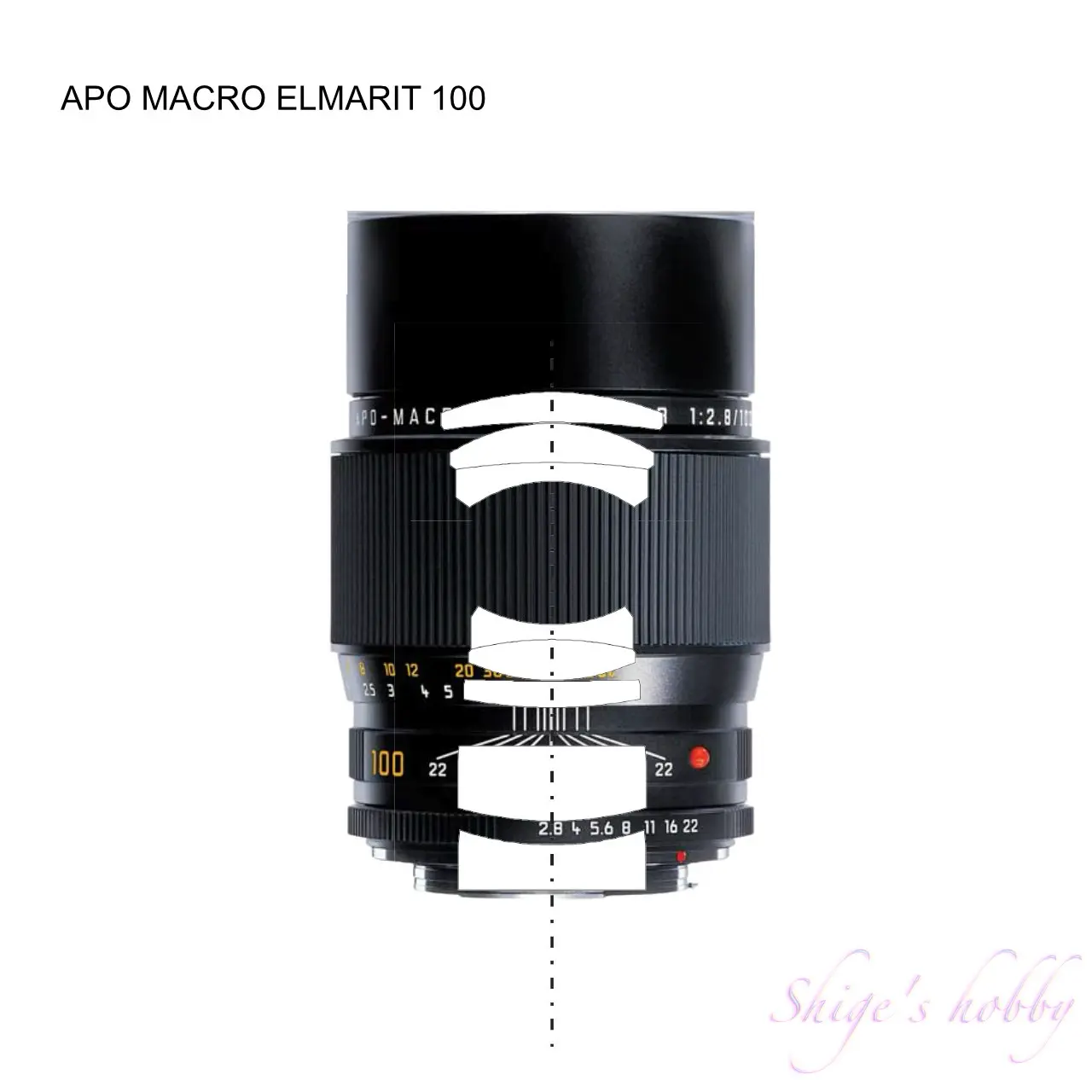
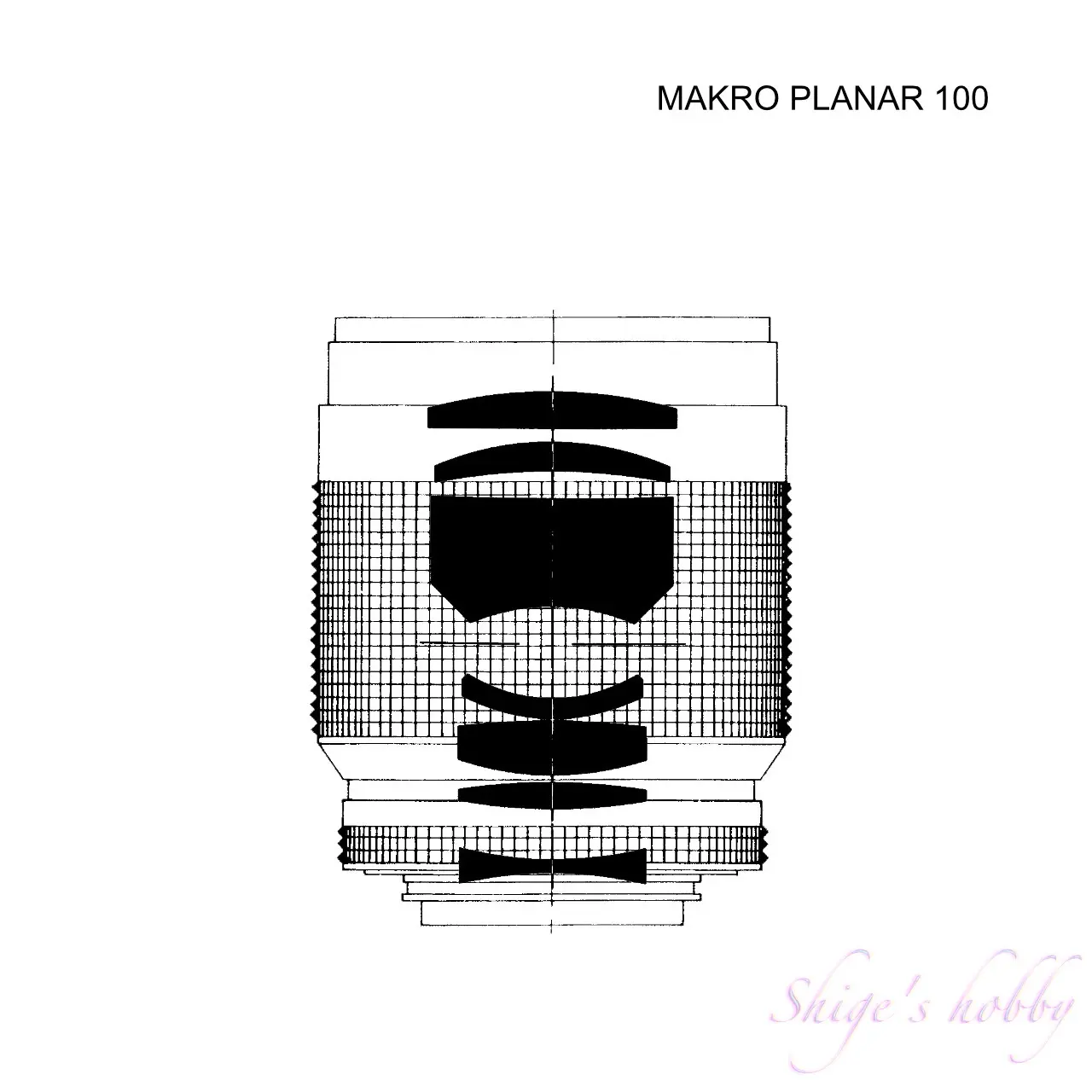
Reference links
- APO MACRO ELMARIT 100mm F2.8 Leica wiki
- Nikon One Thousand and One Nights: Night 25 Ai Micro Nikkor 55mm F2.8 (Part 1)
- LEND.DB Carl Zeiss Makro-Planar T* 100mm F/2.8 [AE]
- A Walk Through Camera Terms No. 15: Image Magnification and Shooting Magnification (Part 1) – Digital Camera Watch
- An eye-opener! Takashi Namiki’s flower photography techniques | How to use a macro lens you never knew about – Kitamura Camera ShaSha
- Digital camera Q&A answer “Please tell me the focusing method and features of the lens.” – Fujifilm
- All about the R-type Leica / Author: Shinichi Nakamura / Edited by Asahi Sonorama ・Ads by Amazon
Affiliate links
- Leica R lens・Ads by ebay
- Leica M lens・Ads by ebay
- Leica TL・Ads by ebay
- Leica SL・Ads by ebay

Update history
- 2025.10.31
- 2025.3.31
- 2024.10.18
- 2024.2.9:Update the article
- 2022.1.31:First draft

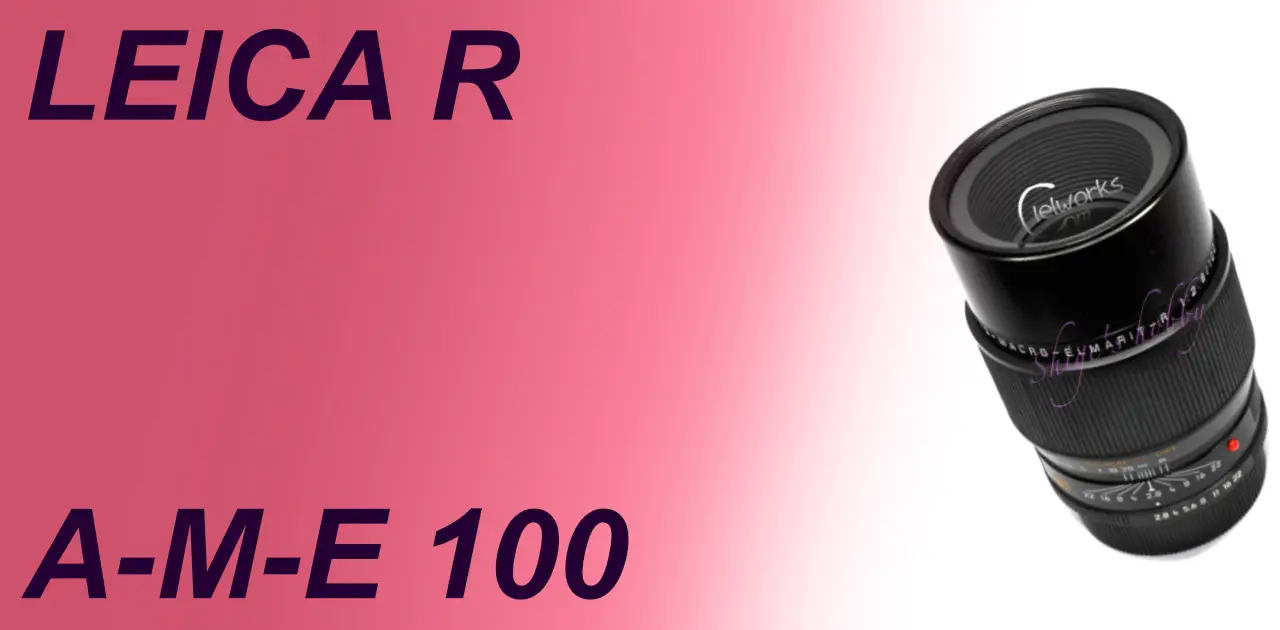

Be First to Comment